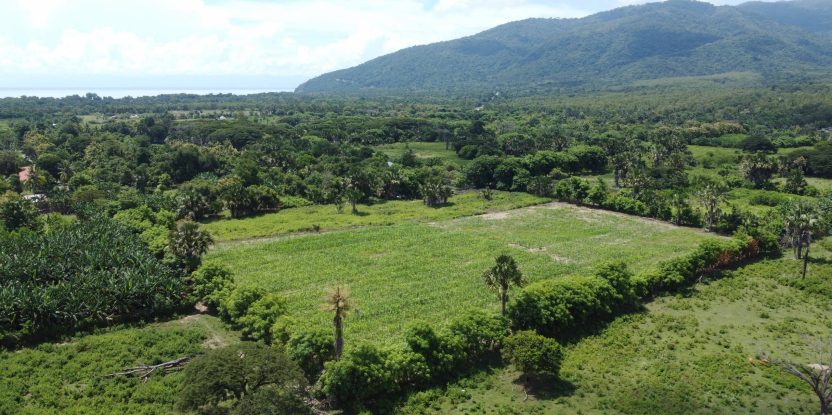A policy dialogue on agroforestry-based forest landscape restoration was held in Dili, Timor-Leste’s capital, on 5 November 2024. The event was organized under the Development of Agroforestry Models for Promotion of Reforestation in the Different Agroecological Zones in Timor-Leste project.
The initiative is funded by the Asian Forest Cooperation Organization (AFoCO), implemented by the Directorate General of Forestry (DGF) under the Ministry of Agriculture, Livestock, Fisheries and Forestry (MALFF) in partnership with the Center for International Forestry Research and World Agroforestry (CIFOR-ICRAF).
The dialogue aimed to share lessons learned from the project while identifying barriers and opportunities for implementing agroforestry practices. Recommendations were provided to promote the implementation of sustainable and good agroforestry practices across Timor-Leste’s diverse landscapes.
“We also aimed to strengthen collaboration between the government, NGOs, community groups and the private sector,” said Yustina Artati, CIFOR-ICRAF senior research officer and co-project leader.
Government commitment and scientific evidence
The event opened with remarks from Marcos da Cruz, Minister of MALFF and; Fernandino Vieira da Costa, State Secretary of Forestry.
Speakers included Himlal Baral, CIFOR-ICRAF senior restoration scientist; Tendy Gunawan, rural development and technical and vocational education and training officer at the International Labor Organization (ILO); Mario Godinho, project manager; and Carlos Correia, partnership and certification manager at Rai Matak Foundation.
Timor-Leste faces significant challenges related to deforestation, land degradation and climate change. In response, the country’s government has prioritised agroforestry as a cornerstone of its sustainable development policies and strategies. This approach integrates trees and shrubs into agricultural landscapes, offering a proven solution to combat climate change, biodiversity loss and rural poverty.
“Agroforestry has been traditionally practised for generations in Timor-Leste, known locally as kuda kahur,” noted da Costa in his opening remarks. “However, traditional practice often lacks modern enhancements, such as crop rotation and optimised regular tree spacing, which could significantly boost higher productivity.”
Multi-stakeholder collaboration for ecosystem restoration
Despite governmental and organizational efforts, reforestation and land restoration have not kept pace with the rate of deforestation and land degradation. Himlal Baral supported this view, highlighting CIFOR-ICRAF’s research: “Decades of studies show that agroforestry supports a wide range of ecosystem goods and services, offering a win-win solution for restoring degraded land while achieving multiple climate and development goals.”
Mario Godinho explained that the project was designed to strengthen Timor-Leste’s reforestation and sustainable forest management efforts. This was achieved through developing and disseminating agroforestry-based reforestation models, institutional capacity building, promoting community-based natural resource management, collaborating with other directorates-general within MALFF and strengthening links with knowledge-sharing events at a regional level.
The project ran from January 2021 to December 2024, targeting six sites across four municipalities — Ermera, Liquica, Bobonaro and Covalima — representing five agroecological zones. Activities included participatory land-use planning, establishing demonstration plots and applying customary regulations (tarabandu) to guide sustainable practices.
“We did participatory land-use planning at all sites,” said Godinho,” and established agroforestry demonstration plots in all five agroecological zones. We also conducted several tarabandu, a long-established Timorese customary regulation mechanism that guides people’s interactions with one another and with the environment. Tree-growth monitoring was an important activity to ensure we could measure results. We also developed an agroforestry training manual.”
The project team also carried out a capacity development need assessment with the Directorate-General of Forestry and the subsequent capacity building plus produced a website, a ‘lessons learned’ video and shared their knowledge at events with Timorese stakeholders and internationally.
With 80% of Timor-Leste’s population primarily engaged in subsistence farming, the agroforestry sector holds untapped potential. Tendy Gunawan of ILO underscored the importance of developing value chains for niche and premium products, leveraging Timor-Leste’s status as a low-development country to secure preferential trade agreements.
“We are focusing on working on ‘best-bet’ value chains that could achieve the largest gain,” said Gunawan. “To produce niche and premium products while using the low-development country status to achieve preferential trade arrangements in target markets.”
Carlos Correia of the Rai Matak Foundation explained that Rai Matak is a national programme that involves small-scale farmers in forest conservation, led by communities, which improves their income through carbon credit sales. They have been running for over a decade through the Ho Musan Ida (With One Seed) project and received expansion support from the European Union, providing annual incentives to farmers in exchange for forest care. Farmers receive USD 0.50 per surviving tree per year, and a trust fund has been established that is owned and managed by communities and which can be drawn on for communal projects.
“Rai Matak collaborates, educates, communicates, propagates and intercultivates trees with crops. We achieved compliance in 2016 with the Gold Standard for carbon credit sales, creating forest jobs and empowering farmers, supporting economic activities based in rural communities through a community-based resource fund,” said Correia.
The foundation also developed a tree-growth monitoring app, TreeO2, with an accompanying dashboard, a list of numerous established nurseries and plans to conduct extensive training programmes. Future plans include expanding these initiatives across the country.
“To restore degraded forests and land in Timor-Leste,” said Minister da Cruz in his closing remarks, “we require multistakeholder collaboration to implement agroforestry that provides livelihood opportunities to communities while improving ecosystem services.”
We want you to share Forests News content, which is licensed under Creative Commons Attribution-NonCommercial-ShareAlike 4.0 International (CC BY-NC-SA 4.0). This means you are free to redistribute our material for non-commercial purposes. All we ask is that you give Forests News appropriate credit and link to the original Forests News content, indicate if changes were made, and distribute your contributions under the same Creative Commons license. You must notify Forests News if you repost, reprint or reuse our materials by contacting forestsnews@cifor-icraf.org.
